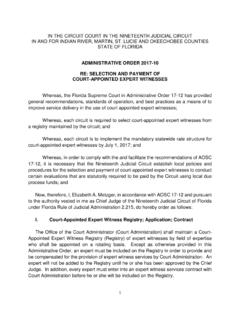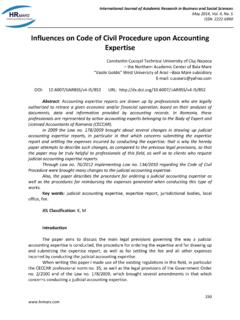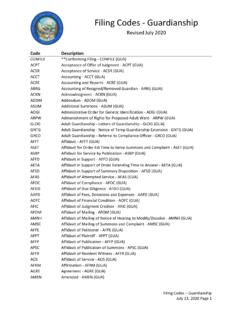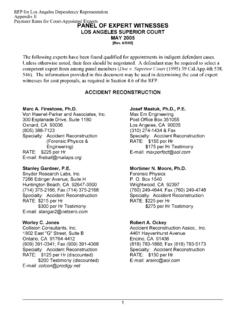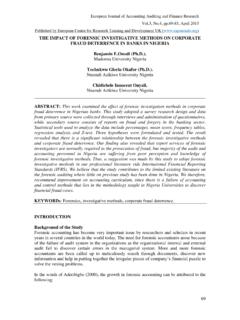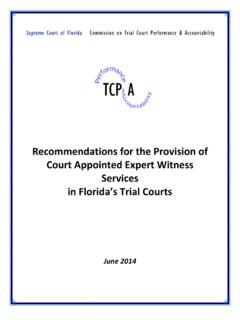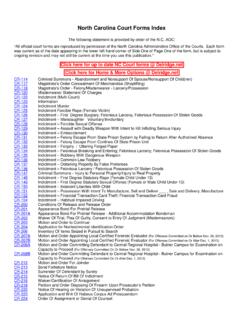Transcription of ECONOMISTS AS ARBITRATORS - Emory Law
1 SIDAK GALLEYSFINAL 3/23/2016 12:01 PM ECONOMISTS AS ARBITRATORS J. Gregory Sidak* ABSTRACT Whenever a claimant in arbitration prevails, the tribunal must calculate quantum. Indeed, sometimes the central question in arbitration is to value a disputed asset. However, an arbitrator s expertise typically is law, not economics. How can the tribunal apply economic analysis to the question of quantum with the same intellectual rigor that it has applied legal analysis to the anterior questions of jurisdiction, liability, defenses, and the like? One way is to appoint an economist as one of the ARBITRATORS . A second way is for the tribunal to appoint its own neutral economic expert . Either approach would expedite the arbitration by causing parties to submit more realistic estimates of quantum and to explain in a more systematic and helpful manner the robustness of those estimates and the assumptions underlying them.
2 INTRODUCTION An arbitral tribunal must calculate quantum anytime a claimant prevails. Indeed, sometimes the central question in arbitration is how to value a disputed asset. However, an arbitrator s expertise typically is law, not economics. How can the tribunal apply economic analysis to the question of quantum with the same intellectual rigor that the tribunal has applied legal analysis to the anterior questions of jurisdiction, liability, defenses, and the like?1 One way is to appoint an economist as one of the ARBITRATORS . A second way is for the tribunal to appoint its own neutral economic expert . Either approach would expedite the arbitration by causing parties to submit more realistic estimates of quantum and to explain in a more systematic and helpful manner the robustness of those estimates and the assumptions underlying them.
3 * Chairman, Criterion Economics, , Washington, Email: I thank Hernando Diaz-Candia, James Flynn, Martin Hunter, Gustaf M ller, Philippe Sands, Joshua Simmons, and Robert Volterra for helpful comments. The views expressed are solely my own. 1 The answer to this question is broader in scope than the subject of this Essay. For an insightful attempt to provide the broader answer with respect to investor-state disputes, see Joshua B. Simmons, Valuation in Investor-State Arbitration: Toward A More Exact Science, 30 BERKELEY J. INT L L. 196 (2012). SIDAK GALLEYSFINAL 3/23/2016 12:01 PM 2106 Emory INTERNATIONAL LAW REVIEW [Vol. 30 In this Essay, I examine the use of ECONOMISTS as ARBITRATORS or tribunal-appointed neutral experts in international arbitration. I analyze how either approach can raise the standard of intellectual rigor in party- expert testimony and expedite the determination of quantum.]
4 I draw insights from my experience as a court-appointed neutral economic expert on damages for Judge Richard Posner under Rule 706 of the United States ( ) Federal Rules of Evidence in two patent litigations between 2012 and 2014 Brandeis University v. East Side Ovens, Inc.,2 and Northgate Technologies, Inc. v. Stryker I have elsewhere written about my experience both serving as Judge Posner s neutral economic expert and my recommendations on how to make the best use of a neutral economic expert in American Both cases show how a neutral economic expert s involvement in a dispute can create an incentive for parties to present more plausible damages estimates and thus narrow the bid-ask spread between their respective estimates of quantum. In Part I, I explain that calculating damages inherently requires economic analysis, which, in my experience, is often absent from much accounting -based expert testimony.
5 The rules of prominent arbitration institutions require an expert to be independent and impartial to safeguard a tribunal s access to the expertise it needs to render an award. In this way, these institutions further differentiate their proceedings from traditional litigation, making those proceedings more valuable in cases requiring complex analysis of business disputes. In Part II, I explain why economic expertise in the arbitral tribunal is desirable. Justice Stephen Breyer and Judge Posner have identified a similar need for neutral expertise in litigation in the United States. In Part III, I explain that both the selection of an arbitrator with economic expertise and the tribunal s appointment of a neutral economic expert would create greater benefits than costs for the parties to the arbitration.
6 2 order 5, Brandeis Univ. v. East Side Ovens, Inc., Nos. 1:12-cv-01508 1:12-cv-01513 ( Ill. Mar. 16, 2012) ( order appointing Gregory Sidak as expert on damages). 3 See generally Complaint, Northgate Techs., Inc. v. Stryker Corp., 10 F. Supp. 3d 958 ( Ill. 2014); Curriculum Vitae of J. Gregory Sidak, Criterion Economics, LLC, (last visited Feb. 27, 2016). 4 J. Gregory Sidak, Court-Appointed Neutral Economic Experts, 9 J. COMPETITION L. & ECON. 359, 359 (2013) [hereinafter Sidak, Court-Appointed Neutral Economic Experts]. SIDAK GALLEYSFINAL 3/23/2016 12:01 PM 2016] ECONOMISTS AS ARBITRATORS 2107 I. USING IMPARTIAL ECONOMIC EXPERTISE TO PRODUCE MORE INTELLECTUALLY RIGOROUS ESTIMATES OF QUANTUM Investor-state arbitration or international commercial arbitration typically requires each party to estimate damages. Given that the calculation of damages is inherently an economic endeavor, tribunals need economic expertise to reach an intellectually rigorous finding of the magnitude of quantum.
7 A. The Unique Contribution of Economic Expertise In international arbitration, the claimant bears the burden of proving that it has suffered harm, what the quantum of damages is, and the causal connection between the respondent s conduct and the damages The tribunal may not accept the claimant s damages estimate if the tribunal considers it to be based on insufficient evidence. It may be difficult for the claimant to prove its damage claim without economic expert Computation of damages in both arbitration and litigation typically relies on but-for analysis. The methodology asks what the claimant s revenue (or costs) would have been but for the harm-causing act or omission. The arbitral award should compensate for all consequences of the harmful act or omission as if it had not In other words, the award must equal the economic difference between the claimant s financial situation in the real world and in the but-for An important aspect of this task is to disaggregate and remove the impact of industry and macroeconomic changes what ECONOMISTS call exogenous factors.
8 To project the value of a business, one must thus 5 See INT L INST. FOR THE UNIFICATION OF PRIVATE LAW, UNIDROIT PRINCIPLES OF INTERNATIONAL COMMERCIAL CONTRACTS art. (2010) ( Harm must be a direct consequence of non-performance as well as certain. ) [hereinafter UNIDROIT PICC]. See generally HERFRIED W SS, ADRIANA SAN ROM N RIVERA, PABLO T. SPILLER & SANTIAGO DELLEPIANE, DAMAGES IN INTERNATIONAL ARBITRATION UNDER COMPLEX LONG-TERM CONTRACTS 78 184 (Loukas Mistelis ed., 2014). 6 Cf. R. Wisner, J. W. William Rowley & A. N. Campbell, Effective Use of Economic Expertise in International Arbitration: Counsel s Role and Perspective, in 1 EU AND US ANTITRUST ARBITRATION: A HANDBOOK FOR PRACTITIONERS 240, 8-007 (Gordon Blanke & Phillip Landolt eds., 2011) ( expert evidence relating to the quantification of damages arising from breaches of contract may involve the application of economic principles.)
9 7 Id.; see, , UNIDROIT PICC, supra note 5, art. ( The aggrieved party is entitled to full compensation for harm sustained as a result of non-performance. Such harm includes both any loss which it suffered and any gain of which it was deprived .. ); see also 1 HANDBOOK OF LAW AND ECONOMICS 100 01 (A. Mitchell Polinsky & Steven Shavell eds., 2007) (explaining that the standard remedy for breach of contract is expectation damages, which put the injured party in as good a position as he would have been in if the contract had been performed ). 8 W SS ET AL., supra note 5, at 256, SIDAK GALLEYSFINAL 3/23/2016 12:01 PM 2108 Emory INTERNATIONAL LAW REVIEW [Vol. 30 apply economic principles and methods to the facts and data of the dispute to determine the conditions of the but-for world. It is essential to understand the fundamental methodological difference between expert testimony that rests on accounting conventions and expert testimony that rests on economic reasoning.]
10 accounting and economics are not substitutes for one another. They are different fields that are complementary to one another. As Nobel laureate Ronald Coase explained decades ago, accounting records merely disclose figures relating to past operations. 9 accounting analysis is, in essence, backward-looking. The focus of accounting is to track stocks and flows of assets and liabilities. When examining the actions of a firm in a commercial dispute, accounting conventions can be useful for categorizing the facts as they are. accounting enables a firm or outside auditor to track a firm s financial health or its position within an industry, relative to similar firms. However, accounting does not reveal anything about causal relationships among the variables it tracks. Economic analysis, in contrast, can provide intellectually rigorous estimations of a rational party s behavior in the but-for world.


